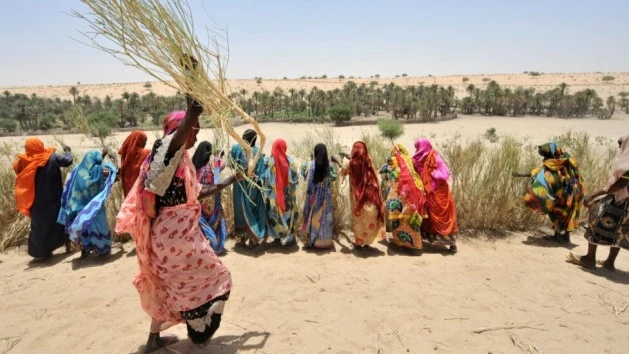Data uncover chances for women in Tanzania’s political landscape

CULTURAL factors are holding back equal participation of women in politics.
Far from socio-economic obstacles, the majority of men are not willing to be politically led by women due to historical backgrounds according to UN Women research findings.
President Samia Suluhu Hassan goes down in history not only as the first woman head of state in Tanzania but also in the East African region as a whole.
However, President Samia stands as the first woman Vice President in the country serving between 2015 and 2021.
On the other hand, Dr. Tulia Ackson, Speaker of the National Assembly emerged as the first woman President of the Inter-Parliamentary Union (IPU) from Africa and the third one globally. She is the 31st President since the inception of the IPU in 1889.
In the National Assembly, Nenelwa Mwihambi, serves as the first woman Clerk since the establishment of the law making body in 1926 when it was known as the Legislative Council of Tanzania Mainland, then known as Tanganyika.
The struggle of these three women in assuming such top political positions is viewed by some political analysts as finally Tanzania is at least seeing the light at the end of the tunnel towards gender equality in the country’s political landscape.
Experience by interviewed politicians testifies that a woman sweat away more than a man in becoming an established politician with discouragements rising from the family level to stiff competition within the corridors of political parties.
Their point of views can be linked to this year’s International Women’s Day (IWD) that went by the global theme: 'Count Her In: Invest in Women. Accelerate Progress.’
The global theme aligns with the priority theme for the United Nations (UN) 68th Commission on the Status of Women (CSW 68) and examines pathways to greater economic inclusion for women and girls around the world.
In Tanzania, the same day was celebrated under the theme: ‘Invest in Women: Accelerate Progress’, a resounding and critical call to action for the government, private sector, civil society organizations and individuals to collectively act towards ensuring commitment to gender equality and women empowerment.
Defenders of human rights say that women are left behind in assuming top political positions due to economic, education, cultural and ethnic related setbacks.
It’s been six months ahead of the 2024 local government elections and women rights defenders recommend that to successfully achieve the 50/50 gender equality in political leadership, women empowerment is inevitable.
In Tanzania, there were only eight elected woman parliamentarians after the first multiparty elections in 1995. Ten years later, 17 women were elected to parliament, representing 7 percent of legislative seats.
Jesca Msambatavangu, Iringa Urban Legislator (CCM) says it is high time to break all sorts of stereotypes against women in politics.
Stereotypes against women in the local political landscape have been scaring them away in getting into politics, adds Msambatavangu, a senior politician with an experience of 15 years.
“Since independence, Tanzania is finally led by a woman president. She is not just a woman, but a woman with her own abilities and courage to lead a male dominated leadership system,” says Msambatavangu, adding since President Samia Suluhu Hassan assumed the top office in March 2021, she has become a motivational to senior and junior politicians in the country.
The President has been appointing women to hold political positions at different levels in line with Article 21 (1) of the country’s Constitution of 1977 that states: “Every citizen of the United Republic is entitled to take part in matters pertaining to the governance of the country, either directly or through representatives freely elected by the people, in conformity with the procedures laid down by, or in accordance with, the law.”
According to Msambatavangu, the journey to achieving equality in politics has been steadily achieved in the sixth regime under President Samia.
John Mnyika, CHADEMA Secretary General, said that cost for the election process is one of the setbacks for women to contest for political positions.
He said most women lack resources starting at the family level whereas some communities deny them access to basic rights such as land ownership.
“We need proportional representation in political decision making bodies. Why are special seats only for women? Questioned Mnyika; highlighting the need to change the attitude towards women if equality is to be attained.
Inequality during elections is also observed in media outlets, insisting candidates should be given equal airtime during campaigns, at both public and private media.
Mnyika's arguments are in line with Article 74 (3) of the Presidential, Parliamentary and Local Government Elections Act 2024 which states: “Every government owned media house that publishes information concerning the election process shall be led by the pillar of avoiding favouritism and any sort of segregation in the way it treats contestants in its new coverage.”
Reports by the President’s Office, Public Service Management and Good Governance show that women ministers had increased from six in December 2005 to eight in December 2010.
In December 2015 there were 10 ministers, the number dropped to four in December 2020. As of April 2024 the cabinet had seven women ministers and four deputy ministers.
The National Bureau of Statistics (NBS) report for 2020 indicates a total of 264 election constituencies in the United Republic of Tanzania of which 50 are in Zanzibar islands.
It states that four popular political parties had at least 20 percent of women candidates in constituencies for the 2020 general elections.
The ruling party Chama Cha Mapinduzi (CCM) from the 264 constituencies picked 27 women to contest for the Member of Parliament (MP) positions.
The leading opposition—CHADEMA had chosen 64 women, ACT Wazalendo had 23 women candidates and the Civil United Front (CUF) had 32 candidates.
NBS indicates that there are 26 sitting elected women MPs in the National Assembly equivalent to 10 percent of the 264 total elected MPs.
There are 113 Special Seats MPs forming a total of 139 women MPs (37 percent) of all 393 MPs in 12th National Assembly.
Elected women ward councillors accounts for 3.8 percent (204), there are 1,611 special seats councillors, (30 percent) making a total of 1,815 women councillors (33.8 percent) of the total 5,353 councillors. Of the number, men councillors are 5,149 (96.2 percent).
Mainland Tanzania has a total of 185 district council chairpersons of whom six (3.2 percent) are women.
The 2019 local government election results as announced by the President’s Office, Regional Administration and Local Government (PO-RALG), shows there are 246 women village chairpersons (2.1 percent) of 12,161 while men are 11,915.
It states that women elected street chairpersons are 528 of 4,699 while men are 4,171. Hamlets' elected women chairpersons are 4,201 of 66,813 while men are 62,612.
Vanessa Rutabana (21) the sitting President of the Students’ government at Muhimbili University of Health and Allied Sciences (MUHAS) said negative community perceptions over women leaders is the main challenge towards achieving 50/50 in politics.
“It wasn’t easy for me to be elected to this position as men dominated the number of candidates and voters. I contested with three male students,” said Rutabana.
Akila Mollel (23) Retired President of Students’ government at Mzumbe University Morogoro Main Campus (2022-2023) said that confidence which most young women lack helped her to win the position against four male students who contested for presidency.
Mollel recommends that political parties should invest in grooming young women to become competent politicians.
Data for the 2022 Global Parliamentary Report by the Inter-Parliamentary Union (IPU) shows that 21 women have emerged as presidents and heads of governments globally since the past three decades.
Africa has had five presidents namely: Joyce Hilda Banda-Malawi (April 2012- May 2014), Ellen Johnson Sirleaf-Liberia (January 2006-January 2018), Ameenah Gurib-Fakim-Mauritius (June 2015- March 2018), Sahle-Work Zewde-Ethiopia (October 2018 to date) and Samia Suluhu Hassani-Tanzania (March 2021 to date).
The IPU report states that as of January 2021, women parliament speakers were 20.9 percent (The percentage might have increased following the appointment of Dr Tulia Ackson as the Speaker of the Parliament on January 20, 2022).
Women deputy Speakers form 28.3 percent; Women MPs form 25.5 percent which is an increase of 14.2 percent from 11.3 percent in 1995.
It asserts that globally, only six countries have achieved the 50/50 representation in parliaments namely Rwanda (61.3 percent), Cuba (53 percent), Nicaragua (52 percent), Mexico (50 percent), New Zealand (50 percent) and United Arab Emirates (50 percent).
“There are 23 countries globally that have exceeded 40 percent of women MPs in their law making bodies of which 13 are in Europe, six are in Africa, three in Latin America and the Caribbean while one country is in Asia,” reads the IPU report.
The report ranks Tanzania as the second country in East Africa with the highest women MPs in parliament behind Rwanda which has 61.3 percent.
The report indications are supported by Section 10 (c) of the Political Parties Affairs (Amendment) Act No. 3 of 2024 which states: political parties shall administer programmes and initiatives for promotion of gender and social inclusion by initiating programmes for capacity building for women, youth and persons with disability to become leaders in or outside the party as well as establishment of gender and social inclusion desk for coordinating the implementation of gender and social inclusion laws and policies and handling complaints regarding gender issues.
Rights for women participation in politics and vie for political positions is in line with treaties that the government has signed such as the Universal Declaration of Human Rights 1948, Beijing Declaration, the Sustainable Development Goal No. 5 and the 2030 Agenda which have been adopted in domestic legislations.
Lilian Liundi, Tanzania Gender Networking Programme (TGNP) Executive Director said in a recent interview that Tanzania needs to register more elected women leaders in the coming local government elections, especially those under the age of 35.
According to her, unequal ownership of resources such as land and material wealth at the family level are among key setbacks for young women to fully engage themselves in active politics alongside household duties that claim up to 90 percent of time spent by rural young women in household duties.
Liundi commended the government’s efforts towards achieving 50/50 on top political positions.
“Tanzania is yet to realize 50/50 in political leadership positions. There is a need to put more effort into increasing women's dominance in political positions especially in decision-making positions,” Liundi asserts.
TGNP is playing its role in encouraging young women to participate in elections as candidates and voters.
It recently organized a three-day workshop that brought together 97 young women university students’ governments leaders from eleven universities who were sensitized on leadership related matters.
“Candidates selection in political parties for streets, villages, wards and constituencies positions should observe the 50/50 benchmark,” said Liundi.
Speaker of the National Assembly Dr Tulia Ackson said the new political parties’ law doesn’t entail any sections that obligate political particles to observe 50/50 in nomination of their election candidates.
“Each political party has procedures for candidates’ nomination. The 50/50 benchmark must be achieved through fair competition in political parties. We cannot uplift women in politics just because they are women but only if they are competent contestants,” said Dr Ackson.
Top Headlines
© 2024 IPPMEDIA.COM. ALL RIGHTS RESERVED

























